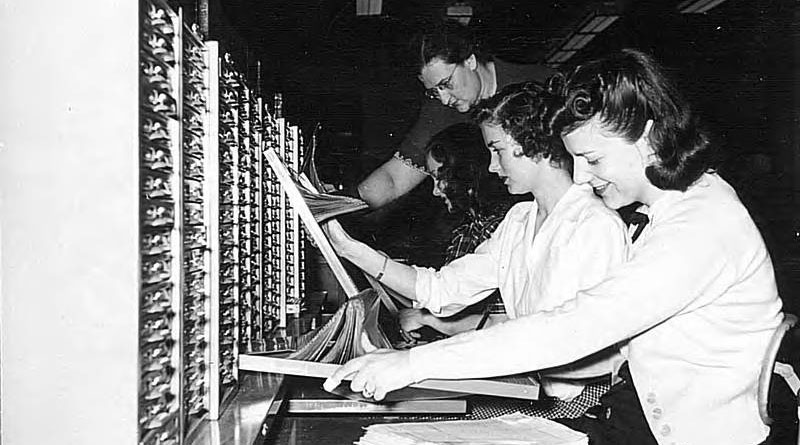Old Gold: Keepers of the Flame
 F.W. Kent Collection of Photographs (RG 30.0001.001), Buildings Series, Folder “Jessup Hall,” University Archives, The University of Iowa Libraries
Workers in the Office of the Registrar during the 1950s in Jessup Hall.
F.W. Kent Collection of Photographs (RG 30.0001.001), Buildings Series, Folder “Jessup Hall,” University Archives, The University of Iowa Libraries
Workers in the Office of the Registrar during the 1950s in Jessup Hall.
Businesses come and go. Clubs and organizations close. Churches merge. Sometimes it seems that the only constant in our lives is change.
Old Gold realizes this sentiment is a bit of an exaggeration, but we also know it holds true more often than not. Change can be gradual or abrupt, expected or unforeseen, planned or unsettling. No matter the form or circumstance, it is the natural consequence of an endeavor that has run its course.
When an entity closes, its memory may persist for years afterward. Perhaps photographs, documents, or other records of its activity will be preserved. Perhaps the records will find their way to a repository someplace, such as a library, archives, or historical museum. Perhaps someone in your family is the designated historian, the keeper of the flame.
In some instances, a state or federal law may require the preservation of records. Such is the case with Iowa colleges and universities that no longer exist. As a service to the state, the University of Iowa plays a vital role in ensuring the safekeeping of these records.
Chapter 264 of the Code of the State of Iowa, titled “Perpetuation of College Credits,” spells out the mandatory transfer of the academic records of students and specifies the UI’s Office of the Registrar as the central depository. The UI Archives partners with the registrar’s office in preserving these files.
Why keep such records? The reasons are practical and are also rooted in historical interests. For example, an alumnus of such an institution may need proof of academic credit in order to apply to graduate school, or to prove such an educational background for certification or job applications. If historic, the records may also be a gold mine of information for genealogists.
The student records of about two dozen closed Iowa institutions are maintained under this law. Parsons College in Fairfield, for example, was open for classes for nearly a century, until it was forced to close in 1973 due to declining enrollment. The college, which opened in 1875, represents the largest single set of records preserved under Chapter 264. By contrast, Charles City College, in Old Gold’s home town, existed for less than two years, from 1966 to 1968, a venture that never caught on. (U.S. Sen. Charles Grassley, incidentally, was a political science instructor at Charles City College early in his career as an Iowa state legislator.) The Charles City College of the 1960s is not to be confused with the Charles City College that was founded in 1891, a Methodist academy that merged with Morningside College in Sioux City in 1914 and where its records remain today.
The Federal Educational Rights and Privacy Act (FERPA), also known as the Buckley Amendment, generally prohibits disclosure of a student’s records to a third party. However, depending on the institution’s policy, a deceased student’s records may be disclosed.
Learn more about UI’s unique role in preserving this part of Iowa history from this archive's resource guide: lib.uiowa.edu/sc/archives/faq/faqcolleges/. For a list of Iowa colleges that have closed, merged, or changed names, go to collegehistorygarden.blogspot.com/2014/12/iowa-colleges-that-have-closed-merged.html.
